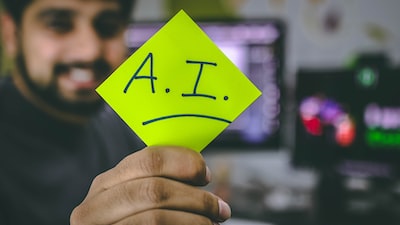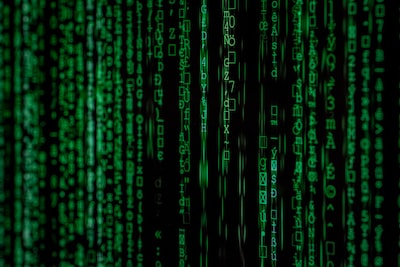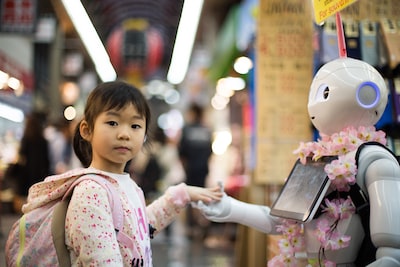Exploring AI’s Impact on Writers and Educationists

Artificial Intelligence (AI) has become an increasingly prevalent force in various industries, revolutionizing the way we work and live. In this blog, we will delve into the specific impact of AI on writers and educationists.
With automation becoming more common, AI’s influence on job prospects for writers and educationists is a topic of concern. We will explore how AI is automating content creation and teaching tasks, and discuss strategies for adapting skills to remain competitive in this changing landscape.
But it doesn’t stop there. We will also examine the potential impact of AI on education itself. From the automation of traditional education models to AI-powered cheating tools and personalized tutors, we will uncover the ways in which AI is reshaping the educational landscape.
Additionally, we will dive into topics such as adaptive testing, automating grading systems, and the ethical implications of educational AI.
Join us as we explore the present and future of writers and educationists in an AI-driven world, providing insights and strategies to navigate this ever-evolving field.

The Rise of AI in Various Industries
The rise of AI is fundamentally reshaping various industries, among them the domains of writing and education. Artificial intelligence, or AI, is at the forefront of this transformative shift, impacting job prospects for writers and educationists alike.
In the writing sector, the integration of AI and advanced technologies has brought about significant changes, automating not only content creation but also editing processes. Through the deployment of AI-powered tools and platforms, writers are now able to streamline their workflow, allowing for improved productivity and more efficient content generation.
Similarly, the education sector has witnessed a paradigmatic shift as AI-powered technologies enable the personalization of learning experiences. By leveraging natural language processing and machine learning algorithms, educators are able to cater to the diverse needs of learners, creating a more engaging and effective learning environment.
Whether it is in the form of AI-driven chatbots in classrooms or the development of advanced plagiarism detection systems, AI is revolutionizing not only how education is delivered but also how it is experienced.
As such, the future of writers and educationists in an AI-driven world holds immense potential, as they navigate new opportunities and challenges while harnessing the power of AI to shape the future of their respective industries.

Current Impact of AI on Job Prospects for Writers and Educationists
The impact of AI on job prospects for writers and educationists is a topic of great interest in today’s rapidly evolving technological landscape.
As artificial intelligence (AI) continues to advance, it is fundamentally transforming the way content is created and consumed, leading to changes in the demand for human writers and educators. AI-powered tools, driven by machine learning and data science, have the potential to automate various writing tasks, such as content generation and proofreading, potentially reducing the demand for traditional writers.
However, this doesn’t mean that writers and educationists are becoming obsolete. Instead, they have the opportunity to leverage AI technologies and enhance their writing skills, critical thinking, and creativity levels by working collaboratively with these new technologies.
The integration of AI in education presents myriad opportunities for educationists to personalize learning experiences, improve student assessments, and provide more effective feedback to learners.
By leveraging AI-powered chatbots and virtual tutors, educationists can create a seamless transition between in-person and online learning, catering to the needs of learners in a dynamic and digital age.
AI algorithms can analyze vast amounts of student performance data and provide insights, allowing educationists to identify areas where students may be struggling and provide targeted support. Moreover, AI can automate grading systems, reduce grading bias, and ensure student equity in the evaluation process.
However, it is important to acknowledge the potential ethical implications and challenges associated with AI integration in writing and education. Issues such as privacy, data security, bias in algorithms, and the impact on employment need to be carefully considered and addressed.
Writers and educationists must keep up with evolving technologies, acquire new skills in areas such as machine learning, automation, and analytics, and stay informed about the latest trends in AI to stay relevant in the workforce.
The future of work and education will heavily depend on the efficient and ethical integration of AI technologies, and it is crucial for writers and educationists to harness the potential of AI while upholding the core values of their professions.
Automation of Content Creation and Teaching Tasks
AI is playing a significant role in transforming the writing and education industries. With the rise of automation, AI-powered tools have revolutionized content creation and teaching tasks. These tools assist writers and educationists in their work, allowing for a more efficient and streamlined process.
From automating content creation and editing to providing personalized learning experiences, AI has opened up new possibilities for both fields. Writers can leverage AI tools to enhance their research and fact-checking abilities, while educationists can benefit from automating assessments and grading systems.
This seamless integration of AI technology is reshaping the job prospects for writers and educationists, requiring them to adapt to new ways of teaching and learning.
By embracing AI and acquiring new skills, writers and educationists can harness the potential benefits of AI and ensure a seamless transition into the AI-driven future of their respective fields.

Adapting Skills to Remain Competitive in the Changing Job Market
In the era of the ever-evolving job market, writers and educationists must adapt their skills to remain competitive.
The rise of AI, artificial intelligence, and new technologies are transforming the landscape, requiring professionals to embrace the opportunities and challenges presented by this AI revolution.
It is no longer sufficient to solely rely on traditional writing skills or teaching methods, as the impact of AI on the workforce necessitates the development of new skills and approaches.
For writers, it is crucial to not only master the art of storytelling but also demonstrate proficiency in utilizing AI-powered tools and leveraging data-driven insights to propel their craft forward.
By seamlessly integrating AI algorithms, writers can tap into the power of machine learning, data science, and natural language processing to create compelling, engaging content that resonates with today’s learners and readers.
Additionally, developing critical thinking skills, and problem-solving abilities, and embracing technologies such as chatbots and chatGPT can allow writers to navigate the evolving landscape with confidence.
Educationists, too, must adapt and evolve in an AI-driven world. Embracing the potential of AI, educational institutions can personalize learning experiences, automate administrative tasks, and provide intelligent feedback to students.
By leveraging AI-powered tools, teachers can unlock insights into student performance, adapt instructional strategies, and ensure equitable educational opportunities for all learners.
To remain competitive and meet the demands of the future of work, educators must also develop their skills in areas such as analytics, data science, and deep learning, enabling them to harness the potential benefits of AI in the classroom.

Exploring the Potential Impact of AI on Education
The potential impact of AI on education is immense and transformative. Artificial intelligence is revolutionizing the classroom today, leveraging new technologies and reshaping the future of education.
From chatbots and virtual tutors to adaptive testing and personalized learning experiences, AI is transforming the way students learn and educators teach.
By incorporating AI-powered tools and techniques, educators can provide personalized instruction tailored to individual student needs. These tools analyze data, algorithms, and natural language processing to understand learners’ patterns and deliver customized content, enabling seamless transitions and fostering mastery of subjects.
Additionally, AI automates administrative tasks such as grading, freeing up time for teachers to focus on meaningful interactions and personalized instruction.
By harnessing the potential of AI and embracing new ways of teaching and learning, educational institutions can empower their students with the necessary skills for the future of work in an AI-driven world.
The Automation of Traditional Education Models
The automation of traditional education models is driving a revolution in the way educators approach their roles.
With the rapid advancement of artificial intelligence (AI) and other new technologies, educational institutions have the opportunity to leverage AI-powered tools to enhance student learning experiences and ensure a seamless transition to new ways of teaching.
By freeing up time previously spent on routine tasks like grading papers and creating lesson plans, educators can focus on delivering more personalized instruction and support to their students, fostering critical thinking and problem-solving skills.
AI’s ability to analyze individual students’ strengths and weaknesses enables the delivery of adaptive learning experiences that cater to their unique needs, promoting mastery and deeper understanding.
While the potential benefits of AI in education are immense, there are concerns surrounding the future of the teaching profession. Some worry that the widespread adoption of AI could lead to job displacement for educators.
Therefore, it is vital to ensure that AI is deployed ethically and responsibly, preserving the essential human connection between teachers and students. To navigate this transformative era, educators must stay informed about AI developments, actively participate in discussions, and adapt their skills to embrace new technologies.
By harnessing the potential of AI and combining it with the expertise of educators, we can shape a future of education that empowers learners and prepares them for the ever-evolving workforce.
AI-Powered Cheating Tools and Services
The rapid advancement of artificial intelligence (AI) and its widespread integration across various industries have brought numerous benefits, along with a myriad of challenges.
Nowhere is this more evident than in the realm of education, where the rise of AI-powered cheating tools and services has become a significant concern for educators and institutions alike.
These sophisticated tools, driven by powerful algorithms and machine learning capabilities, enable students to cheat by generating essays, completing assignments, or even providing direct answers to test questions.
The use of AI in cheating raises serious ethical concerns and poses substantial challenges for the education system as a whole. It undermines the integrity of the learning process and diminishes the value of assessments, calling into question the authenticity of students’ accomplishments.
In response, educational institutions are taking steps to detect and prevent the use of AI-powered cheating tools. Plagiarism detection software and advanced analytics are being employed to identify patterns of cheating behavior, but the evolving nature of AI technology presents an ongoing challenge.
While the existence and utilization of AI-powered cheating tools present a threat to academic integrity, it is crucial to acknowledge the potential benefits of AI in education.
By integrating AI technology, personalized learning experiences can be created, administrative tasks can be automated, and virtual tutoring or teaching assistance can be provided. The potential of AI to revolutionize education and enhance student learning is immense.
However, striking a delicate balance between harnessing the potential benefits of AI while effectively addressing the growing concern of cheating remains an urgent priority.
Personalized Tutors & Disability Assistance in an AI Era
In today’s era of artificial intelligence (AI) and the rise of new technologies, personalized tutors and disability assistance are reshaping the job market for writers and educationists.
With AI-powered tutoring and disability aid, the field of education is experiencing a transformative shift. Leveraging the power of AI, students now have access to tailored learning experiences that leverage the potential of AI in education.
Personalized tutors, powered by AI, provide a seamless transition from traditional teaching methods to new ways of teaching and learning.
AI-powered tutors adapt to each learner’s unique learning style, pace, and preferences, contributing to improved student performance and mastery of educational content. Furthermore, AI plays a significant role in providing valuable assistance to students with disabilities.
By offering real-time transcription services, voice recognition software, and other tools, AI ensures inclusivity and equal opportunities for learners across the board.
However, it is vital to consider the ethical implications of relying solely on AI in education. While AI enhances the learning experience, it must not replace the human element of teaching.
Maintaining human interaction and empathy in education is crucial for learners’ holistic development. Therefore, educators and policymakers must navigate the integration of AI into educational institutions and curricula carefully.
Adaptive Testing and Ensuring Student Equity
Adaptive testing, powered by AI, has the potential to revolutionize education by providing personalized and tailored learning experiences for students.
This form of testing utilizes AI algorithms to assess students’ knowledge and skills in real-time, allowing educators to adjust instruction based on individual needs. By adapting the difficulty level and content of the test, adaptive testing ensures that each student is appropriately challenged and has the opportunity to demonstrate their full potential.
Moreover, adaptive testing helps address issues of student equity by providing equal access to tailored learning experiences, bridging the gap between students with different learning styles, abilities, and backgrounds.
By offering personalized support and resources, AI-powered adaptive testing promotes a more inclusive and equitable education system.
The integration of AI in adaptive testing allows educators to leverage machine learning and data science to gain valuable insights into student performance.
Through the analysis of vast amounts of data, AI algorithms can detect patterns, trends, and learning gaps, empowering educators to make data-driven decisions and enhance their teaching strategies.
Whether it involves identifying areas where students need additional support or recognizing their strengths, adaptive testing equips educators with the information they need to guide instruction and foster student growth.
As the future of education continues to be shaped by AI and other emerging technologies, adaptive testing stands as a promising tool for ensuring student equity and facilitating personalized learning experiences.
Automating Grading Systems & Reducing Grading Bias with AI
The automation of grading systems and the reduction of grading bias are crucial aspects of integrating AI into education. By harnessing the power of artificial intelligence (AI), educators can streamline the grading process and provide timely feedback to students.
This enables students to learn from their mistakes and make improvements in real time. AI-driven grading systems eliminate human subjectivity, leading to fair and unbiased evaluations.
Through the use of algorithms, AI can analyze vast amounts of data, identifying patterns, and trends in student performance. This data-driven approach empowers educators to tailor their instruction more effectively, ensuring that students receive personalized guidance.
The utilization of AI in grading also saves time and effort for educators, allowing them to focus on other critical aspects of their role.
However, it is essential to consider ethical implications such as data privacy, security, and equal access. Safeguarding student data is crucial to maintain privacy and security.
Additionally, ensuring that AI-powered grading systems are accessible to all educational institutions is necessary to prevent widening educational inequalities.
Striking a balance between leveraging the potential of AI and maintaining fairness and inclusivity in education is paramount.
Examining the Ethics and Implications of Educational AI
The integration of AI in education has the potential to revolutionize the learning experience for students and the role of educators in the classroom.
It presents numerous ethical concerns and implications that need to be carefully examined. One such concern is the issue of data privacy and bias in algorithms, which must be addressed to ensure the fair treatment of students.
Additionally, there is a need to address the potential for AI to replace human teachers, as this raises questions about the role of educators in the future workforce.
Furthermore, the impact of AI on student learning should be considered. While AI can provide personalized learning experiences and assist in identifying areas of improvement, it is important to ensure that students continue to develop critical thinking skills and engage in deep learning.
Finding a balance between leveraging AI for educational purposes and maintaining the value of human interaction and creativity in the learning process is key to harnessing the full potential of AI in education.

The Future of Writers and Educationists in an AI-Driven World
The rise of AI and new technologies is having a profound impact on writers and educationists. As AI continues to advance, it is crucial for professionals in these fields to embrace the potential of AI and leverage it to enhance their skills and stay competitive in the workforce.
In the writing industry, AI tools like chatbots and algorithms are revolutionizing content creation, proofreading, and idea generation. Writers can now harness the power of AI to improve their writing skills, ensure accuracy, and streamline their workflow.
Additionally, in the field of education, AI is transforming the learning experience for students. AI-powered virtual tutors and personalized learning platforms are helping students improve their academic performance by providing tailored guidance and feedback.
However, it is important to strike a balance between AI and human interaction to ensure a seamless transition and maintain the critical thinking skills of learners.
As the AI revolution continues, writers and educationists who adapt to the changing landscape and embrace AI as a tool for collaboration will be well-positioned for success.
Conclusion
As AI continues to advance and reshape various industries, it is crucial for writers and educationists to stay informed and adapt their skills to remain competitive in the changing job market.
Automation of content creation and teaching tasks may streamline processes, but it also opens up new opportunities for creativity and innovation.
In the field of education, AI has the potential to revolutionize traditional models, provide personalized tutoring and disability assistance, and ensure student equity through adaptive testing.
However, we must also examine the ethics and implications of educational AI to ensure its responsible implementation.
The future of writers and educationists in an AI-driven world is promising, but it requires continuous learning and a willingness to embrace technology. To explore the impact of AI on writers and educationists further, download our comprehensive guide now.




